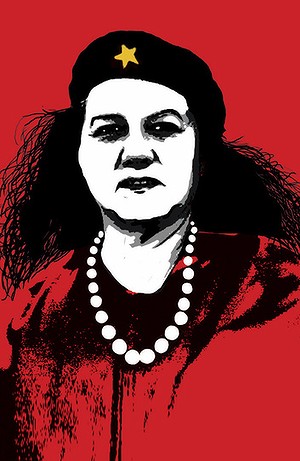Search
Democracy Links
Member's Off-site Blogs
plotting a revolution ....

The truth can finally be told: Gina Rinehart is a double agent, presenting a parody of a billionaire in order to advance her socialist aims. We all know about the overbearing father and his florid third marriage. What daughter would not detest all he stood for?
We can imagine her storming out of Prix d'Amour, disappointed and confused. It was the late 1980s and in the cafe society of Perth there were plenty of socialist agitators ready to pour their poisonous thoughts into the ear of an impressionable young woman.
One of them was a young Nicaraguan insurgent, a veteran of many bloody campaigns. We'll call him Juan.
His face showed the scars of many battles, a map of revolutionary conflicts - here a scar from a soldier's bayonet in Bolivia; there a puncture wound from a gun fight in Venezuela. It was hard not to be moved by his passion. ''Don't walk out on your father,'' Juan would whisper to Gina during long nights in which they'd discuss Mao, Guevara and the role of the peasantry in defeating capitalism. ''Nurse the system close,'' Juan would say, ''the better to kill him later on.''
One night, after a particularly intense discussion of Trotsky's theory of ''permanent revolution'', Gina entered into a pact. She would bide her time, managing her father's wealth until she became the richest woman in the world. Only then would she strike.
The long years she spent as a ''sleeper'' were difficult. All day she would bark at underlings and criticise ''those left-wingers in Canberra''. She would talk as if she cared only about money. What bliss it was each night to slip into her bedroom and - once the door was locked - finally be her true self, lying on the bed flipping through the early writings of Regis Debray or getting lost in the theoretical works of Rosa Luxemburg.
Of course, it was hard to keep it all secret from her four children. One day, Gina was indulging in one of her favourite hobbies, creating tapestries of Bob Brown, a personal hero. She loved the crinkly bit around his eyes. It gave his face a look of kindness and amusement but, by gosh, it was difficult to capture with a needle and thread.
Suddenly she heard the door open. For once she had forgotten to lock it. It was her son, John. ''Mum,'' he said, striding towards her. ''What are you doing?'' He stood behind her, looking down. ''Is that Bob Brown?''
''Um, yes,'' Gina said hurriedly. ''I found it under the bed. One of the servants must have made it. Naturally I'm unpicking it.''
As her son watched on, Gina picked furiously at the threads. How it hurt her to destroy the image, especially the lovely crinkly bit. The life of a double agent was hard, so hard. Her son was silent, standing behind her as she picked the tapestry clean. She could feel her own face burning. He was clearly suspicious. Was it starting to dawn that his mother was the nation's most important socialist agitator?
That night she decided to structure things so the children could not access the family accounts. No way did she want them to see the telltale payments: a parcel of shares for the Chilean strike fund; a few thousand dollars for medical aid in Cuba; the yearly subscription to the FARC rebels in Colombia.
Yes, it was painful to create a breach with the children, but the revolution has its own demands.
Would the pain of alienating her children be worth it? Finally, after all the waiting, she was about to find out. Her old friend Juan organised a meeting, out in her gardener's storeroom, just after midnight. Juan was older, of course, but still entered the room with the stealthy grace of a jungle insurgent.
They drank Fairtrade coffee, brought by Juan, as he laid out his plans. Gina would make a series of videos. They would directly insult Australia's working people, calling them drunks and ingrates. She'd argue that anyone can be a billionaire, studiously ignoring the wealth that had been her birthright. Then - and this was the master stroke - she'd applaud the African mining industry and the way people were willing to work for just $2 a day.
''With a bit of luck,'' Juan said, ''there'll be some terrible massacre of African mine workers just the week before, so your comments will be unimaginably offensive.''
Gina squared her shoulders. She understood the proposal: to express views so extreme that no one would ever take seriously the self-interested whining of the mining billionaires. But still she had doubts. ''You don't think it's too obvious? Just too horrible?''
Juan shook his head. ''It's what is needed. Better still, I want you to wear a really expensive necklace of pearls while you give the speech.''
Even Gina had to smile at that. Yes, she would do it. Even the pearls.
Then she looked up at Juan, her eyes beseeching. It was a look that said: ''I will do this but for how long?'' It was a look that said: ''Surely, some day, even I should be allowed to come in out of the cold.''
- By John Richardson at 22 Sep 2012 - 9:23am
- John Richardson's blog
- Login or register to post comments
Recent comments
36 min 8 sec ago
1 hour 13 min ago
3 hours 15 min ago
5 hours 14 min ago
5 hours 24 min ago
5 hours 34 min ago
6 hours 28 min ago
6 hours 53 min ago
7 hours 1 min ago
8 hours 4 min ago